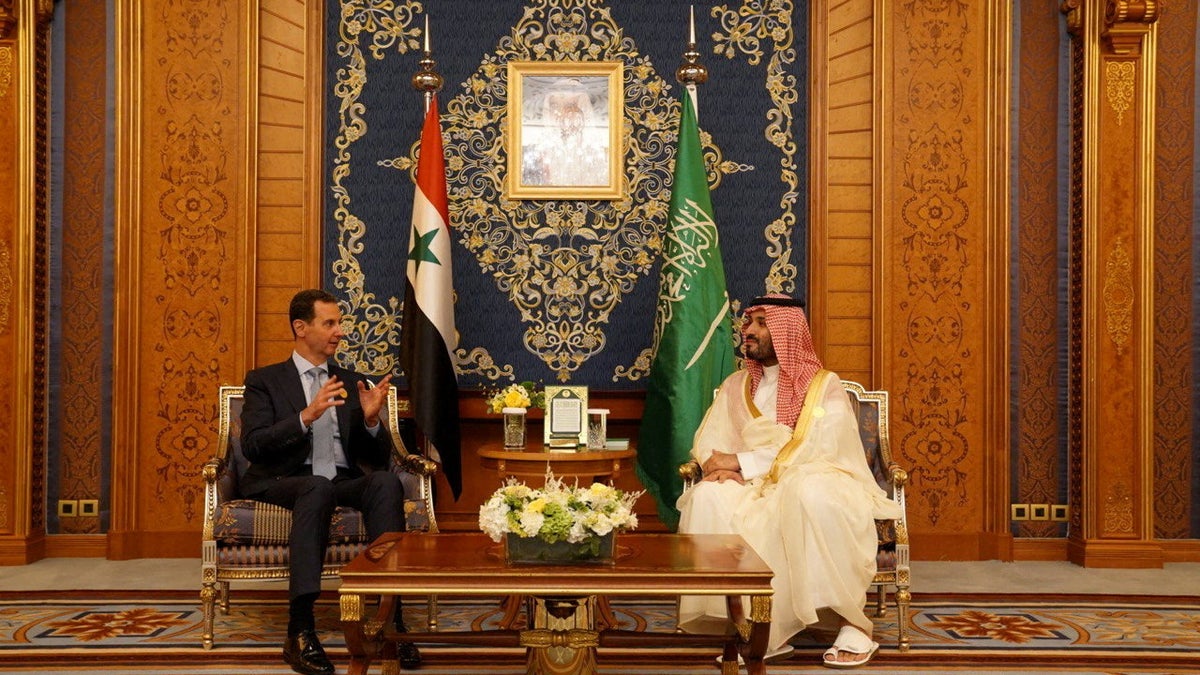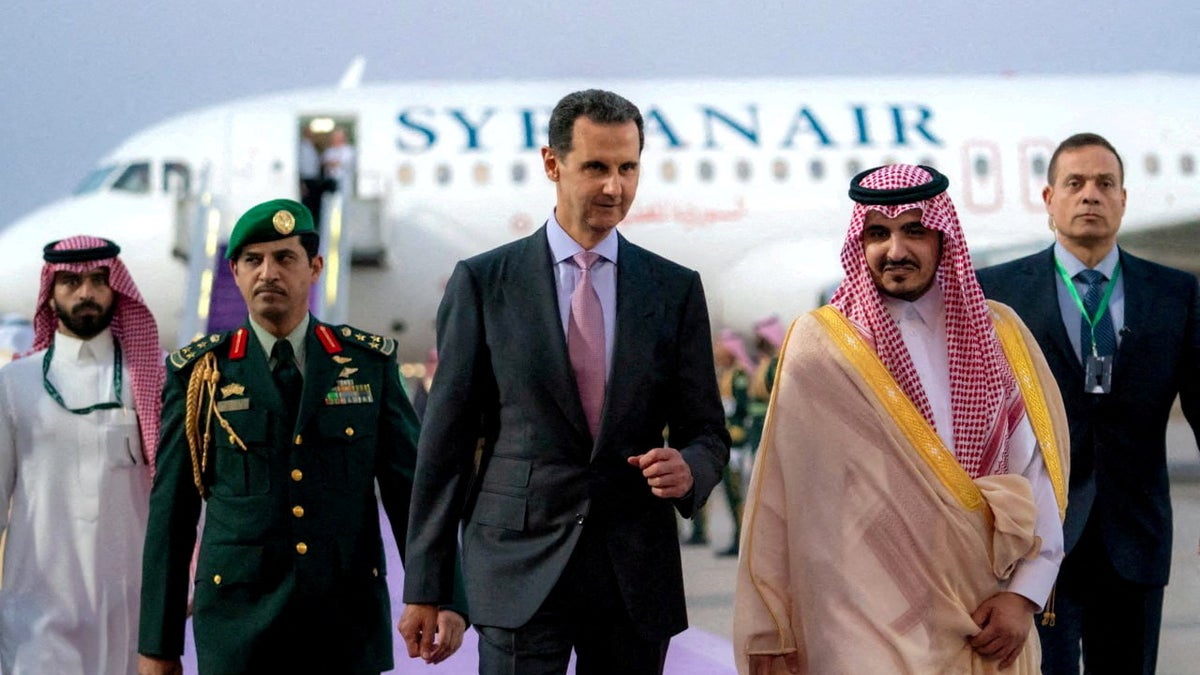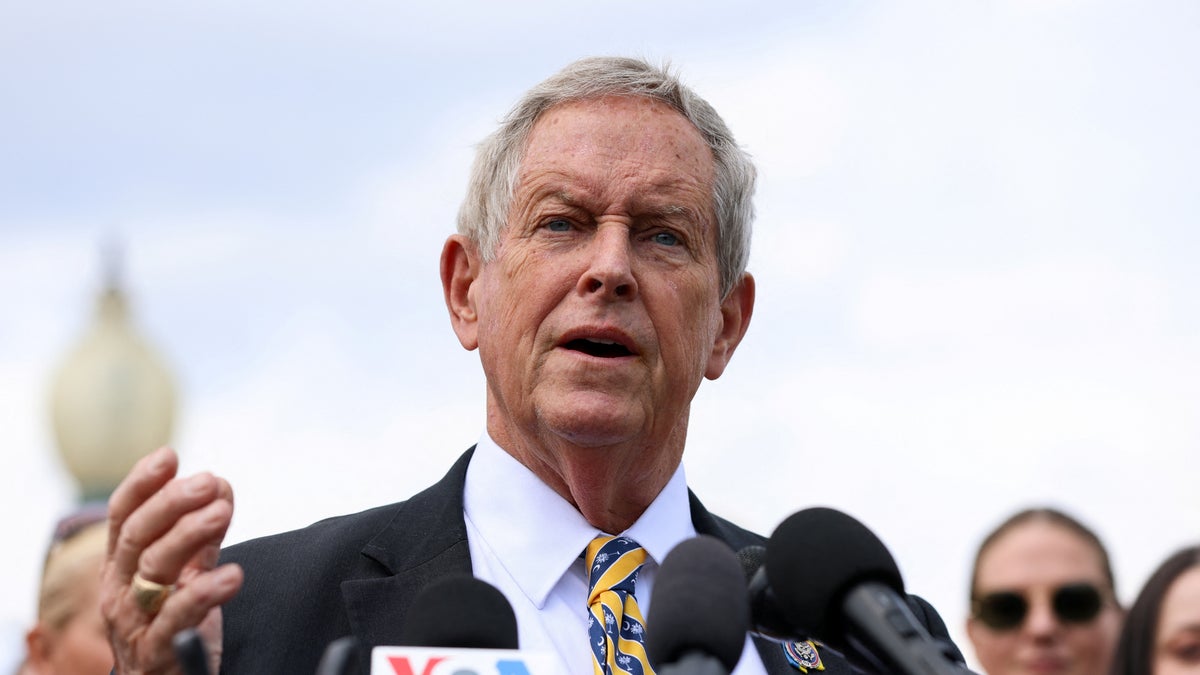Why the Arab League's decision to bring back Assad has 'destroyed' US leverage in Syria
Middle East Institute senior fellow Charles Lister discusses the significance of the Arab League's decision to welcome Syria back into the multilateral body and the Biden administration's response to Arab states' re-engagement.
Syrian President Bashar Assad appeared at an Arab League summit in Saudi Arabia for the first time in more than a decade Friday after his country was expelled in 2011 for its brutal crackdown on peaceful pro-democracy protests during the Arab Spring.
Assad was welcomed back into the fold as part of a reintegration effort on behalf of several regional states, led largely in part by Saudi Arabia and the United Arab Emirates (UAE).
The Biden administration and top White House officials have condemned the move, vowing to continue its policy of keeping Syria an international pariah and continuing to hold Assad accountable for his role in the deaths of hundreds of thousands of Syrians in the country’s more than a decade-long civil war.
One Syria expert told Fox News Digital the Biden administration has been sending mixed messages on its Syria policy in the last several years. The Washington Post quoted a senior Biden administration official in October 2021 who said it did not support Jordan initiating normalization after King Abdullah II spoke with Assad via phone. However, the official said the Biden administration will no longer actively work to stop countries from engaging with Assad, except when the law specifically requires it.
Charles Lister, a senior fellow at the Middle East Institute, said the White House has been giving regional states a sort of yellow light to pursue normalization talks with Damascus while the State Department publicly holds a different position.
"The State Department has consistently been opposed to normalization and supportive of isolation, of sanctions, of punitive actions and what have you. But when you have a government, and particularly the most powerful government in the world, sending such mixed messages, it is no surprise that that has resulted in a completely useless, contradictory policy that ultimately has led us to where we are right now, which is some states in the region attempting to re-engage with the regime, but in so doing, unfortunately, from a U.S. perspective, as an American, they have completely destroyed our leverage," he explained.
THE NUMBER OF REFUGEES FROM SYRIA TOPS 2 MILLION; NEARLY 5,000 A DAY FLEE ACROSS BORDERS
"If we ever were to choose to try to push Syria-related diplomacy, they've killed our leverage because ultimately Bashar al-Assad knows now that he has managed to coerce regional states into effectively capitulating to him. And so, if we as the United States were to ever step up and say, 'Right, time to finally deal with the Syrian crisis, let us launch a major diplomatic process' – the region has already stepped five steps down that ladder and given the regime a great deal more influence and leverage over that process than they had before."

Crown Prince Mohammed bin Salman meets with Syria's President Bashar Assad, in Jeddah, Saudi Arabia, May 19, 2023. (Syrian Presidency/Handout via Reuters)
The Arab League’s consensus decision to welcome the Syrian dictator back has felt like a slap in the face to Syrians forced to flee their homes due to barrel bombings from regime forces and shelling from Russian warplanes.
More than 14 million Syrians have been forced to flee their homes and nearly 7 million are internally displaced.
Khalid al-Shallah, a Syrian living in northwest Idlib province, told Fox News Digital, "We refuse normalization with the regime of Assad, and we cannot reconcile [and] have him as our president." He added, "A criminal terrorist regime has displaced millions of Syrian families to different countries around the world and arrested hundreds of thousands in its prisons, and we do not know their fate."
Al-Shallah and his family fled their home in Maarat al-Numan in 2019 due to constant shelling. He and his family were displaced for several years before moving into an apartment near the Turkey-Syria border.
He shared that despite the hunger and displacement his family experiences, they would rather continue to suffer than reconcile with the regime. "Bashar al-Assad is a war criminal, the killer of children, the biggest terrorist, the head of drug gangs. We are his people and we know him," he said.
US HAS ENGAGED ‘DIRECTLY’ WITH SYRIAN OFFICIALS ABOUT FREEING AUSTIN TICE: STATE DEPARTMENT
The Saudi-led push for re-engagement with the Syrian regime has been described as conditional by Arab governments.
Lister told Fox News Digital that regional states such as Jordan and the UAE were largely inclined to push forward with normalization in an effort to get Syria to address issues they say are affecting their own countries.

Syria's President Bashar Assad arrives in Jeddah, to attend the Arab League summit in Saudi Arabia, May 18, 2023. (Sana/Handout via Reuters)
For example, an end to drug trafficking, the facilitation of refugee returns to Syria, and the countering of corruption, extremism and terrorism inside the country.
Lister said that although the talks have come across as quid pro quo, there are no mechanisms in place to make sure Syria follows through. "None of the communiques, the written statements, the public statements given by officials, none of them have mentioned a single enforcement mechanism, no way to measure whether or not things are being either violated or conceded. And I think that tells us all that we need to know. This isn't really a conditional engagement. This is just an engagement for engagement's sake," he explained.
AIRSTRIKES IN SOUTHERN SYRIA KILL ONE OF COUNTRY’S MOST WELL-KNOWN DRUG DEALERS
He added that Syria has a long track record of creating problems and then being able to control the scale of those problems as a "threat or a tool of coercion" against regional states.
Perhaps the biggest "tool of coercion" the regime possesses is its export of the drug Captagon. The senior fellow said one pill costs a cent to produce and can sell for $15 in the Gulf, proving to be an extremely lucrative business for the regime. In the last several weeks alone, Lister said, nearly $1 billion worth of Syrian-made Captagon has been seized in neighboring countries.

A customs officer displays Captagon pills, part $48 million worth of drugs confiscated in Sofia, Bulgaria, in 2007. (Reuters/Nikolay Doychinov)
"[Syria] has this history of sort of turning the tap up when it wants to turn the pressure up and then turning the tap down when it wants to curry some favor. And I think that's probably – we are probably going to see some of that. I think they realize, the Syrian regime, that their biggest method of kind of a coercive influence over particularly Saudi Arabia, lies with the drugs trade," Lister said. "And so I expect that… they may help, you know, leak information or intelligence to the Saudi government or to Jordan, on the southern border, about the identity, the location of certain shipments or certain individuals involved in the drugs trade to try to curry favor and show that it's willing to turn that tap back down again and to give the likes of Saudi Arabia the perception that the Syrian regime is willing to play ball."
A bipartisan group of U.S. lawmakers, led by Rep. Joe Wilson, R-S.C., introduced legislation to prohibit any federal government department or agency from recognizing or normalizing ties with the Assad regime. The Assad Regime Anti-Normalization Act of 2023 would also expand economic sanctions to those "involved in diverting and stealing humanitarian assistance meant for the people of Syria and those involved in stealing the property of the Syrian people for political reasons or personal gain."

Rep. Joe Wilson speaks during a press conference on Capitol Hill, April 25, 2023. (Reuters/Julia Nikhinson)
US HAS ENGAGED ‘DIRECTLY’ WITH SYRIAN OFFICIALS ABOUT FREEING AUSTIN TICE: STATE DEPARTMENT
Wilson told Fox News Digital in a statement that normalization with Assad will be met with consequences. "We appreciate our partners and allies in the Gulf and broader Arab world, but the Arab League should be on notice. Normalization with mass murderer Assad is not the right path forward and as this bipartisan bill illustrates, such actions will be met with consequences. I’m grateful to Chairman Mike McCaul for his support and rapidly moving this legislation forward," he said.
CLICK HERE TO GET THE FOX NEWS APP
The bill was unanimously passed by the House Foreign Affairs Subcommittee on the Middle East, North Africa, and Central Asia last week.









































